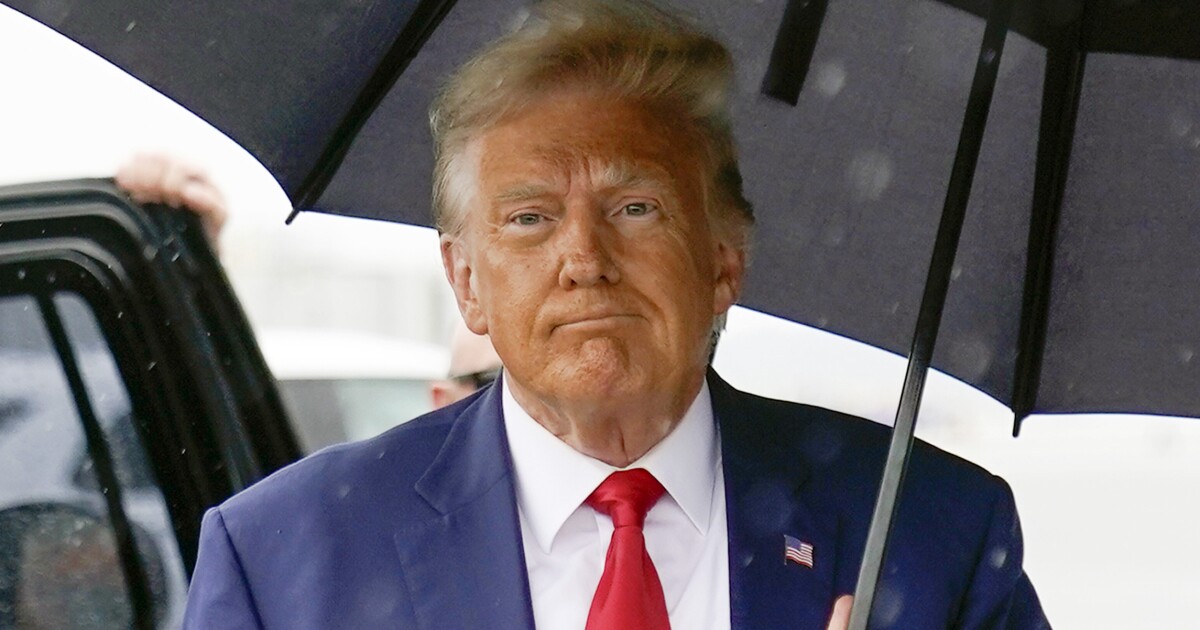

The first Republican presidential debate is fast approaching on Aug. 23, when candidates will hope to close the gap on former President Donald Trump and separate from the rest of the pack. In this series, Up For Debate, the Washington Examiner will look at a key issue or policy every day up until debate day and where key candidates stand. Today’s story will examine their stance on the Justice Department.
Republican 2024 candidates have almost unilaterally used the term “weaponized” to describe the Department of Justice during this election cycle.
They have taken aim at the DOJ’s five-year investigation into President Joe Biden’s son Hunter Biden, which nearly resulted in a “sweetheart” plea deal, as many Republicans have described, before the judge in the case deferred it out of concerns about its unusual provisions.
HOW DEBATE CAN BE MAKE OR BREAK FOR CANDIDATES
They have pointed to John Durham’s report, released in May, as a shining example of FBI missteps during the Trump-Russia collusion era.
Some have elevated concerns that the DOJ and FBI labeled parents of students “domestic terrorists,” discriminated against certain traditional Catholics, or coordinated with social media companies to censor protected speech.
But more than any other issue, all of the candidates have been forced, on multiple occasions, to take a position on the DOJ’s decision to prosecute the primary front-runner, former President Donald Trump.
Candidates have discovered Trump and the DOJ are inextricably tied and that they cannot speak about the department without addressing special counsel Jack Smith’s dual cases against Trump, as well as the state prosecution in New York and one anticipated in Georgia.
Donald Trump
Trump has come out swinging on a near daily basis against the DOJ, using his propensity for nicknames to speak often about the “Department of Injustice” and “Deranged Jack Smith.” He has pleaded not guilty to charges in both of Smith’s criminal cases against him, the Florida case related to classified documents and the Washington case related to the 2020 election.
Trump has vowed to fire Smith, but since 2016, he has more broadly popularized the idea of rooting out the “deep state.”
At his first 2024 rally in Waco, Texas, he declared, “Either the deep state destroys America, or we destroy the deep state.”
In October 2020, Trump signed an executive order on “Schedule F,” which essentially recategorized thousands of federal employees to at-will status, stripping them of certain job protections and making them easier to terminate. The former president plans to revive this order if reelected, as well as remove the “top layers” of the DOJ and FBI, Axios reported last year.
Trump’s GOP critics will say, however, that during his four years in charge, he failed to filter out those deeply embedded in the government who then allegedly weaponized it. Some of those employees, for instance, participated in impeaching him in 2019 over the Ukraine phone call. Trump appointed FBI Director Christopher Wray, which he now says was “probably” a mistake. When the then-president sought to use the power of the DOJ to press states about the 2020 election results, he relied on Jeffrey Clark after his higher-ranking officials refused to partake. Clark is named as a co-conspirator in one of Smith’s indictments of Trump.
Outside of the concerns with politicization at the DOJ, one of Trump’s top legislative accomplishments was passing the First Step Act, a bipartisan but controversial bill aimed at cutting down unnecessary jail time and recidivism in prisons. Some Republicans, including Trump’s leading opponent, have criticized it as a “jailbreak bill” and vowed to repeal or scale it back.
UP FOR DEBATE: TRUMP, DESANTIS, AND 2024 GOP HOPEFULS’ STANCE ON SPENDING AND DEBT
Ron DeSantis
DeSantis, the Florida governor who is trailing Trump in a distant second place in most polls, served in Congress and was a member of the House Judiciary Committee. At the time, he railed against then-President Barack Obama’s perceived executive overreach and led the Faithful Execution of the Law Act, which passed the House in 2014 and would have required the attorney general to report to Congress any time a federal officer established a policy that broke with existing laws. In 2017, he backed Trump during Robert Mueller’s investigation, introducing an amendment that would have curbed funding for it. He criticized it at the time as a “fishing expedition.”
DeSantis, a former prosecutor with a Harvard law degree, made headlines last year as governor when he suspended Hillsborough County State Attorney Andrew Warren, a Democrat, for “neglect of duty.” He cited that Warren pledged not to prosecute those who violated restrictions on abortion or so-called “gender-affirming care” for minors who say they are transgender.
“We are not going to allow this pathogen of ignoring the law get a foothold in the state of Florida,” DeSantis said when he announced Warren’s suspension.
DeSantis railed against Warren as a “Soros-backed” attorney, a reference to Democratic megadonor George Soros. DeSantis lobbed the same attack at Manhattan District Attorney Alvin Bragg when Bragg launched a prosecution of Trump that was related to a hush-money scheme at the local level in New York.
While DeSantis has continued to stand firm in opposition to the three prosecutions of Trump, he has been careful not to be too defensive of Trump on the merits of the cases.
“I don’t know what goes into paying hush money to a porn star to secure silence over some type of alleged affair. I just, I can’t speak to that,” DeSantis said.
DeSantis on likely Trump indictment:
“Look, I don’t know what goes into paying hush money to a porn star to secure silence over some type of alleged affair.” pic.twitter.com/5hOJi78aKU
— Citizen Free Press (@CitizenFreePres) March 20, 2023
Tim Scott
Scott, a sitting South Carolina senator, has promoted optimism on the campaign trail, but during a visit to Iowa at the end of July, he joined in the indictment discourse and said in response to the superseding charges leveled against Trump in Florida, “At the end of the day, what we all should be very concerned about is the weaponization of [the] Department of Justice.”
Scott added, “We should be very careful on how we use this power against political opponents. That is not good for the soul of our country. We need Lady Justice to wear a blindfold.”
He has also echoed anti-establishment calls to eliminate “every single political appointee” in the DOJ. In a social media statement last week, Scott alluded to the investigations into Joe and Hunter Biden, saying, “We’re watching Biden’s DOJ continue to hunt Republicans, while protecting Democrats.”
We’re watching Biden’s DOJ continue to hunt Republicans, while protecting Democrats.
— Tim Scott (@votetimscott) August 2, 2023
Outside of the high-profile issues surrounding the department, Scott, the sole black Republican in the Senate, has made police reform a central issue of his tenure. He introduced the JUSTICE Act, which would bolster federal offenses for things such as falsifying a police report and require officers to report to the FBI every time a gun is discharged.
Nikki Haley
Haley, former governor of South Carolina and U.S. ambassador to the United Nations, has questioned the DOJ’s investigation into Hunter Biden. During a radio interview in May, she proposed the DOJ put the “same energy” it did into the Trump-Russia inquiry into investigating the Biden family.
The FBI lied about the “Russian hoax” and now it refuses to hand over important files about the Biden family’s corruption… no wonder Americans have lost trust in our Justice Department. pic.twitter.com/l6eaDs8Unf
— Nikki Haley (@NikkiHaley) May 16, 2023
Haley has also tapped into the fatigue some voters have over Trump’s legal woes by strategically condemning the indictments against Trump, which are overwhelmingly unpopular among Republican voters, as “drama” that the country must move on from.
This is not how justice should be pursued in our country.
The American people are exhausted by the prosecutorial overreach, double standards, and vendetta politics.
It’s time to move beyond the endless drama and distractions.
— Nikki Haley (@NikkiHaley) June 9, 2023
“Two things can be true at the same time. One, the DOJ and FBI have lost all credibility with the American people,” Haley said during an interview with Fox News in June, adding that a “complete overhaul” of federal law enforcement agencies was needed.
“Two, the second thing can also be true: If this indictment is true, if what it says is actually the case, President Trump was incredibly reckless with our national security,” she added.
In terms of national security, Haley has taken an extraordinarily hawkish stance on China and frequently ties China to the United States’s fentanyl epidemic, two points that fall, in part, under the purview of the DOJ.
Vivek Ramaswamy
Ramaswamy, a biotech entrepreneur, set himself apart on the topic of the DOJ by vowing to pardon Trump if elected and pushing his fellow candidates to agree to do the same. He has also pledged more broadly to pardon those convicted “as part of a politicized prosecution,” including nonviolent Jan. 6 defendants.
Ramaswamy has called for a complete shutdown of the FBI, condemning the current federal “police state” as corrupt and vowing to replace the bureau with a “new apparatus built from scratch that actually respects the Constitution.”
I will end the weaponization of police power in America. Time to stop complaining and actually *fix* the problem without apology:
– Shut down + replace the FBI
– Shut down + replace the IRS
– Pardon all federal defendants prosecuted based on political motives. This includes… pic.twitter.com/dx6CWnthGM— Vivek Ramaswamy (@VivekGRamaswamy) April 1, 2023
Others
Perhaps the most unusual circumstance in the primary is Trump’s former vice president, Mike Pence, challenging him head-on and denouncing him for refusing to accept the results of the 2020 election publicly. Pence is polling in the low single digits but has not bent on his decision in 2021 to break with Trump on the matter.
Pence, a key figure in the most recent indictment, said it “serves as an important reminder: Anyone who puts himself over the Constitution should never be president of the United States.”
He was also quick to create merchandise referencing the indictment’s revelation that Trump called him “too honest” in the lead-up to the election certification.
The campaign is selling T-shirts and hats branded with the phrase “Too Honest,” which is what Trump called his VP when he wouldn’t go along with his plan to overturn the election’s results, something Pence maintained he didn’t have the power to do. https://t.co/NQtVJYsV3Y
— Julia Johnson (@juliaajohnson_) August 3, 2023
More than any other candidate, however, Trump is central to former Gov. Chris Christie’s campaign. The former New Jersey governor and “Never Trumper” has not missed an opportunity to tear into Trump for his actions and the substance of the allegations in the DOJ’s indictments of him.
Additionally, when confronted about remarks DeSantis made that the FBI or DOJ could be spying on the DeSantis campaign, Christie assumed it must be because DeSantis had a questionable background rather than because of any political motivations by the DOJ and FBI, a clear departure from some of the stronger polling candidates in the primary.
CLICK HERE TO READ MORE FROM THE WASHINGTON EXAMINER
However, Christie, who is a U.S. attorney, has not shied away from criticizing the DOJ’s investigation of Hunter Biden.
“There’s no way that it should take five years to get to a two-count misdemeanor tax plea and to dismiss the gun charges,” Christie said.






